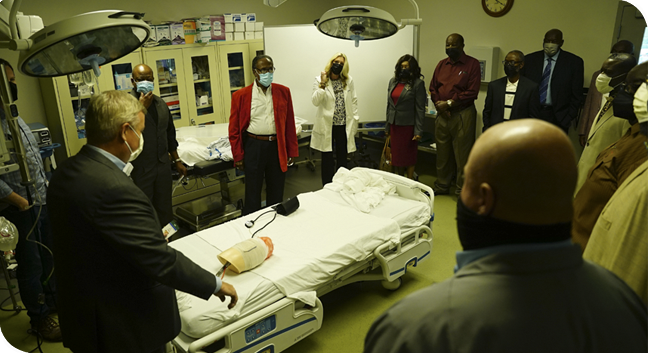Phoebe hosted a listening session with around 20 ministers from various churches in the Albany area Thursday to share some of the health system’s goals and plans for the future and to get input from the faith leaders.
“Phoebe has a long and proud history of service to this community, and we recognize and appreciate the vital role churches and faith leaders play in the success of our community. We know we can have a greater, positive impact on the people of southwest Georgia when we work together with community partners, and we are looking to strengthen our bonds with faith-based leaders,” said Scott Steiner, Phoebe Putney Health System President and CEO.
Steiner led the guests on a tour of the Phoebe Simulation and Innovation Center. During lunch with the ministers Steiner gave details of construction projects, including the Living and Learning Community and the new ER/NICU/critical care expansion. Other Phoebe leaders, including Phoebe Putney Health System Chief Medical Officer Dr. Dianna Grant and new Phoebe Putney Memorial Hospital CEO Deb Angerami, also spoke and shared Phoebe’s commitment to improving access to healthcare.
“We’re excited where we’re going with health equity and community health. We want to find ways to break down barriers so we are able to deliver the right care at the right time for the right cost,” Steiner told the group.
Mt. Zion Baptist Church Senior Pastor Dr. Daniel Simmons highlighted one successful partnership between his church’s Samaritan Clinic, Phoebe and Morehouse School of Medicine. Over the last year, the Elevation Project has coordinated men’s health events at churches where hundreds of men have been screened for prostate cancer. The program is now expanding to focus on women’s health issues, as well.
“We are bringing wellness to the community. What we have been able to accomplish has happened because of these partnerships, and we want more churches to participate,” Rev. Simmons said.
Steiner said today’s luncheon is just the first activity in what will be ongoing outreach to the faith community.
“There’s no better avenue to communicate with our community than through our ministers and our faith-based organizations, and we look forward to continuing and expanding this kind of dialogue,” Steiner said.
Original source can be found here.


 Alerts Sign-up
Alerts Sign-up